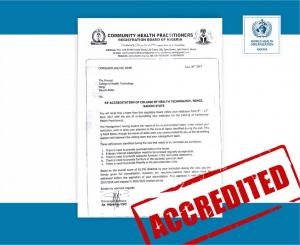Nigeria Closes Gaps in Human Resource for Health as Another Institution Gets Full Accreditation
Bauchi, 04 August 2017 - Community Health Practitioners Board of Nigeria has awarded full accreditation status to the School of Community Health, College of Health Technology Ningi, Bauchi state in northeastern Nigeria.
Community Health Practitioners Board of Nigeria is the agency responsible for regulating community health training in Nigeria. The agency regularly carries out assessment of Community health training institutions to assess their capacity to train qualified Community Health Extension Workers (CHEWs) and Junior Community Health Extension Workers (JCHEWs) nationwide. The Board awards either provisional or full accreditation status that is valid for 2 or 4 years.
The outcome of the accreditation exercise, which was earlier conducted by a 5-member team, indicate that the Ningi College of Technology scored 81.5%, which is commensurate to full accreditation.
With the full accreditation, the college is eligible to carry out academic sessions and produce the required human resources for health (HRH). The accreditation, which is valid for 4 years, will elapse in 2021/2022 session. During the period, 300 CHEWs and 200 JCHEWs are expected to graduate with diploma and certificate courses respectively as well as partake in national examination exercises of other health training institutions organized by the board.
The provost of the College, Dr Sambo Alkali who was visibly pleased by the accreditation stated, “This milestone would not have been reached without the technical and financial support of the WHO”. He added that technical and financial support provided by WHO to the school that “was instrumental to the attainment of its full accreditation”.
The Provost assured the review team of his commitment to work with WHO to address residual gaps identified in order to make the school a citadel of learning.
The school was previously able to obtain a provisional accreditation from the regulatory agency since its establishment in 1999. With the commencement of the HRH project in 2014, WHO has been supporting the College to meet its accreditation requirements by providing items for the demonstration room, teaching aids, school curriculum; students manuals, library and ICT items as well as office furniture. Additionally, WHO supported the College to develop and implement its strategic plan, which is instrumental to addressing the identified gaps during the previous accreditation visit that was conducted in 2015. Just in the last 3 years, the School has graduated 171 (79 females: 92 males) CHEWs and 259 (134 females:125 males) JCHEWs.
The Health Systems Advisor of the WHO in Nigeria, Dr Teniin Gakuruh reaffirmed the commitment of the Organization towards training of frontline health workers in Bauchi state using funds from global Affairs Canada with a view to addressing the chronic shortage of the required health workers in the state.
The Health Systems Advisor of the WHO in Nigeria, Dr Teniin Gakuruh reaffirmed the commitment of the Organization towards training of frontline health workers in Bauchi state using funds from Global Affairs Canada with a view to addressing the chronic shortage of the required health workers in the state.
WHO is currently supporting the availability of frontline health workers in Nigeria with specific focus on Bauchi and Cross River, acting as focal states through the 5 year WHO HRH project titled “enhancing the ability of frontline health workers to improve health in Nigeria” with direct funding from Global Affairs Canada.
Communications Officer
WHO Nigeria
Email: hammanyerok [at] who.int (hammanyerok[at]who[dot]int)
Tel: +234 803 979 5149
Email: gakuruht [at] who.int (gakuruht[at]who[dot]int)




